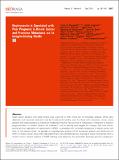Nephronectin is Correlated with Poor Prognosis in Breast Cancer and Promotes Metastasis via its Integrin-Binding Motifs
Author(s)
Toraskar, Jimita; Redvers, Richard P.; Valla, Marit; Magnussen, Synnøve N.; Bofin, Anna M.; Opdahl, Signe; Lundgren, Steinar; Eckhardt, Bedrich L.; Doherty, Judy; Anderson, Robin L.; Svineng, Gunbjørg; Steigedal, Tonje; Lamar, John; Hynes, Richard O.; ... Show more Show less
Download1-s2.0-S1476558617305468-main.pdf (925.7Kb)
PUBLISHER_CC
Publisher with Creative Commons License
Creative Commons Attribution
Terms of use
Metadata
Show full item recordAbstract
Most cancer patients with solid tumors who succumb to their illness die of metastatic disease. While early detection and improved treatment have led to reduced mortality, even for those with metastatic cancer, some patients still respond poorly to treatment. Understanding the mechanisms of metastasis is important to improve prognostication, to stratify patients for treatment, and to identify new targets for therapy. We have shown previously that expression of nephronectin (NPNT) is correlated with metastatic propensity in breast cancer cell lines. In the present study, we provide a comprehensive analysis of the expression pattern and distribution of NPNT in breast cancer tissue from 842 patients by immunohistochemical staining of tissue microarrays from a historic cohort. Several patterns of NPNT staining were observed. An association between granular cytoplasmic staining (in < 10% of tumor cells) and poor prognosis was found. We suggest that granular cytoplasmic staining may represent NPNT-positive exosomes. We found that NPNT promotes adhesion and anchorage-independent growth via its integrin-binding and enhancer motifs and that enforced expression in breast tumor cells promotes their colonization of the lungs. We propose that NPNT may be a novel prognostic marker in a subgroup of breast cancer patients.
Date issued
2018-04Department
Massachusetts Institute of Technology. Department of Biology; Koch Institute for Integrative Cancer Research at MITJournal
Neoplasia
Publisher
Elsevier
Citation
Steigedal, Tonje S. et al. “Nephronectin Is Correlated with Poor Prognosis in Breast Cancer and Promotes Metastasis via Its Integrin-Binding Motifs.” Neoplasia 20, 4 (April 2018): 387–400 © 2018 The Authors
Version: Final published version
ISSN
1476-5586